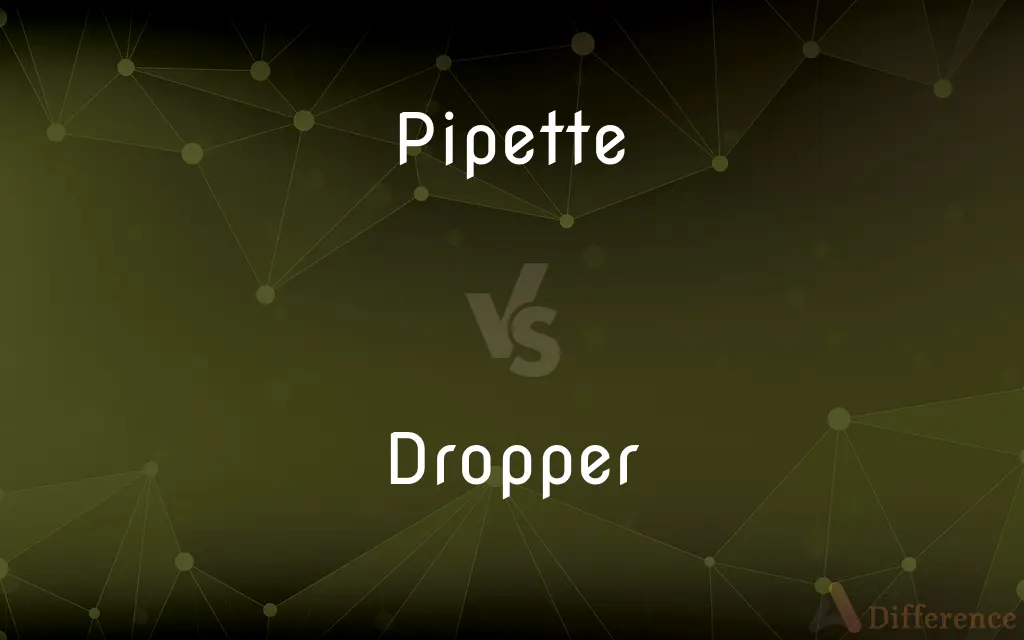Pipette vs. Dropper — What's the Difference?
By Urooj Arif & Fiza Rafique — Updated on March 8, 2024
A pipette is a lab tool used for transferring measured volumes of liquid, known for precision and accuracy. A dropper, conversely, is simpler, used for transferring small quantities of liquid without precise volume control.

Difference Between Pipette and Dropper
Table of Contents
ADVERTISEMENT
Key Differences
Pipettes are essential in laboratory settings for accurately measuring and transferring specific volumes of liquids. They come in various types, including volumetric and graduated pipettes, each designed for different levels of precision and types of measurements. Droppers, on the other hand, are more basic tools consisting of a small tube with a rubber bulb used to suck up and release liquids. They are commonly used in medicine, chemistry, and biology for general, non-quantitative transfers.
While pipettes can be adjusted to dispense varying volumes of liquid with high accuracy, droppers generally lack measurement markings and are not designed for precise volume control. This makes pipettes more suitable for scientific experiments where precise quantities are crucial, whereas droppers are better for applications where general volume transfer is sufficient.
Pipettes often require additional equipment like pipette tips and sometimes electronic pipette fillers to operate, emphasizing their role in precise and controlled liquid handling. Droppers are self-contained and do not typically require any additional equipment, making them more straightforward and convenient for quick or informal use.
Pipettes, especially those designed for precise measurements, may require training or practice to use effectively. This is because the accuracy of the volume transferred can be affected by factors such as user technique and the pipette's calibration. Droppers, due to their simplicity, are generally easier to use and do not require special training, making them accessible to a wider range of users, including children in various settings.
The design of pipettes has evolved to include features such as digital volume settings, ergonomic designs, and disposable tips to prevent contamination. These features enhance their functionality and accuracy but also increase their cost. Droppers maintain a simple design, which keeps them cost-effective and widely available for a variety of applications, from administering eye drops to feeding animals.
ADVERTISEMENT
Comparison Chart
Primary Use
Precise measurement and transfer of liquids in laboratory settings.
General transfer of liquids without precise measurement.
Accuracy
High accuracy with specific volume measurements.
Low to no accuracy in volume measurement.
Design
Various types (volumetric, graduated), often requires additional equipment.
Simple tube with a rubber bulb.
Usage Complexity
May require training for accurate use, especially with advanced models.
Easy to use, no special training needed.
Cost
Generally more expensive due to precision and features.
Cost-effective due to simplicity.
Compare with Definitions
Pipette
A laboratory tool for accurately measuring and transferring liquids.
She used a pipette to transfer 5 mL of solution into the test tube.
Dropper
Widely used in medicine for administering drops.
The eye drops came with a dropper for easy application.
Pipette
Comes in types like volumetric for single, fixed volumes, and graduated for variable volumes.
For precise measurements, he preferred a volumetric pipette.
Dropper
Lacks precise measurement markings, suitable for general use.
Adding the medication with a dropper, precision was not crucial.
Pipette
Can be manual or electronic, affecting usability and precision.
The electronic pipette made repetitive transfers less tedious.
Dropper
Simple and intuitive to use without training.
He easily applied the solution with the included dropper.
Pipette
Essential for experiments requiring precise liquid volumes.
Accurate data required the use of a calibrated pipette.
Dropper
A simple tool for transferring small quantities of liquid.
She used a dropper to add food coloring to the mixture.
Pipette
Requires regular calibration to maintain accuracy.
The lab technician calibrated the pipettes at the start of each month.
Dropper
Cost-effective for broad applications beyond the lab.
For feeding the tiny kittens, a dropper was the best tool.
Pipette
A pipette (sometimes spelled pipet) is a laboratory tool commonly used in chemistry, biology and medicine to transport a measured volume of liquid, often as a media dispenser. Pipettes come in several designs for various purposes with differing levels of accuracy and precision, from single piece glass pipettes to more complex adjustable or electronic pipettes.
Dropper
One that drops, especially a small tube with a suction bulb at one end for drawing in a liquid and releasing it in drops.
Pipette
A narrow, usually calibrated tube into which small amounts of liquid are suctioned for transfer or measurement.
Dropper
A utensil for dispensing a single drop of liquid at a time.
Pipette
(sciences) A small tube, often with an enlargement or bulb in the middle, and usually graduated, used for transferring or delivering measured quantities of a liquid.
Dropper
One who drops something, especially one who drops a specific item to cause mischief.
The dropper left the suitcase with the bomb next to the garbage can.
Pipette
To transfer or measure the volume of a liquid using a pipette.
Dropper
(computing) A software component designed to install malware on a target system.
Pipette
A small glass tube, often with an enlargement or bulb in the middle, and usually graduated, - used for transferring or delivering measured quantities.
Dropper
(fishing) A fly that drops from the leaden above the bob or end fly.
Pipette
Measuring instrument consisting of a graduated glass tube used to measure or transfer precise volumes of a liquid by drawing the liquid up into the tube
Dropper
(mining) A branch vein which drops off from, or leaves, the main lode.
Dropper
A dog which suddenly drops upon the ground when it sights game.
Dropper
(AU) A batten fixed to a post-and-wire fence to keep the wires apart.
Dropper
(slang) A person who uses fraudulent cheques.
Dropper
A drop shot.
Dropper
One who, or that which, drops.
Dropper
A dropping tube, usually of glass or plastic with a narrow opening at the tip and a rubber bulb at the top which can be squeezed to control intake or outflow of the fluid. The word is used in combinations with obvious significance, as eye dropper, medicine dropper, etc.
Dropper
A branch vein which drops off from, or leaves, the main lode.
Dropper
A dog which suddenly drops upon the ground when it sights game, - formerly a common, and still an occasional, habit of the setter.
Dropper
Pipet consisting of a small tube with a vacuum bulb at one end for drawing liquid in and releasing it a drop at a time
Common Curiosities
How do pipettes and droppers differ in accuracy?
Pipettes are designed for high accuracy with specific measurements, while droppers do not offer precise volume control.
What is a pipette?
A tool used in laboratories for transferring precise volumes of liquid, crucial for accurate measurements in experiments.
Do pipettes require special equipment?
Yes, some types require tips and fillers, reflecting their role in precise liquid handling.
What is a dropper?
A simple device for transferring small quantities of liquid, not designed for precision.
What makes droppers easy to use?
Their simple design with a tube and rubber bulb requires no special skills or training.
Why are pipettes more expensive than droppers?
Their precision, advanced features, and the need for additional equipment contribute to a higher cost.
How often do pipettes need calibration?
Regular calibration is essential for maintaining accuracy, the frequency of which depends on use and manufacturer recommendations.
Can both pipettes and droppers be used in a laboratory setting?
Yes, but pipettes are preferred for experiments requiring accuracy, whereas droppers are used for general purposes.
Is training required to use a pipette effectively?
Yes, especially for types designed for precise measurements, to ensure accuracy and proper handling.
Can a dropper be used for precise measurements?
No, droppers lack the necessary design and markings for precise volume control.
How do users choose between a pipette and a dropper?
The choice depends on the need for precision in volume measurement versus the simplicity and cost-effectiveness for general liquid transfer.
Are droppers suitable for administering medication?
Yes, they are commonly used for this purpose, especially in non-laboratory settings.
What types of pipettes are there?
Includes volumetric, graduated, and electronic pipettes, each suited for different precision levels.
Are droppers reusable?
Yes, but they should be cleaned between uses to prevent contamination, especially in medical applications.
What are common applications for droppers outside the lab?
Administering medications, food coloring, essential oils, and feeding small animals.
Share Your Discovery

Previous Comparison
Oval vs. Elipse
Next Comparison
Epa vs. DhaAuthor Spotlight
Written by
Urooj ArifUrooj is a skilled content writer at Ask Difference, known for her exceptional ability to simplify complex topics into engaging and informative content. With a passion for research and a flair for clear, concise writing, she consistently delivers articles that resonate with our diverse audience.
Co-written by
Fiza RafiqueFiza Rafique is a skilled content writer at AskDifference.com, where she meticulously refines and enhances written pieces. Drawing from her vast editorial expertise, Fiza ensures clarity, accuracy, and precision in every article. Passionate about language, she continually seeks to elevate the quality of content for readers worldwide.














































